|
These are guidelines that I developed over the decades. Will every rule apply to you? Probably not, especially if you are opening for Elton at the Beacon. But for most basic gigs, these recommendations tend to make the night go smoother than bumpier. The first fifteen were: Gig Rule #1: The client is always right – in real time. Gig Rule #2: Gently smile – not grin - at all times. Gig Rule #3: You were hired to play music – not to be funny, tell stories, teach, or be therapeutic. Gig Rule #4: Have a set list with more songs prepared than you will need. Gig Rule #5: Get the venue’s wifi password and log on before you start to play so you can look up a requested song’s lyrics on the fly. Gig Rule #6: If you have never played the venue before, bring extra extension cords as well as a few ground lifts in case of sixty-cycle hum issues. Gig Rule #7: Pack an emergency bag with extra strings, extra bridge pins, an extra XLR cord, nine volt batteries, and _______________. Gig Rule #8: Start on time and play an extra song at the end. Gig Rule #9: Before you finish a song, know what the next song will be and start it as quickly as possible. Gig Rule #10: The only person you are allowed to make a joke about when the mic is live is yourself. Anything else is an unnecessary risk. Gig Rule #11: Don’t swear. Imagine that everyone in front of you has the morals of a born-again Christian. Gig Rule #12: Find out what songs people what to hear and then play them. Gig Rule #13: Make eye contact with the audience at least every ten seconds. Gig Rule #14: Understand and perform to the lowest common denominator in the room and only deviate when fulfilling requests. Gig Rule #15: Solicit requests on a face-to-face basis and then play them. Here we go: Gig Rule #16: If you know before the gig that you have to announce any kind of information, write everything out - including phonetic spellings of tricky names. You trained to be a musician, not a public speaker – but sometimes the gig requires us to be an orator. Preparation is key. Whether on paper or a tablet, use the largest font possible. Go over pronunciations until they roll off your tongue. And speak slowly. Gig Rule #17: People hear what they see so give them both: something to hear as well as see. Don’t be a statue. Occasionally attract the customers’ attention by moving. This is taking eye contact taken to the next level. Most venues don’t give performers a lot of space so your options for movement are mercifully limited. Your moves should not be as severe as the “Hokey Pokey” but a bit more animated than a something you’d see in a wax museum. If some of your listeners have issues with mobility, don’t hesitate to go to them and engage them directly in conversation or even do a song at their table. Make sure if they are in a wheelchair that you are eye-level with them so it is easier for them to look you in the eye and appreciate what you are doing. If you are playing and notice that some of the people in the room have profound hearing loss, hopefully you will know your American Sign Language alphabet and sign a few cordial words to them. I always carry a few balloons in one of my milk crates. Why? If you offer people with severe hearing loss a blown-up balloon, they will be able to hold it gently by their finger tips on either side and feel of the vibrations of music coming out of your amp. It’s just another way for you to have your music connect with the people in the venue. Gig Rule #18: Take the fewest amount of breaks as possible. There are two lines of thought on this. Some say take as few breaks as possible, verging on “continuous”. Others say do “40/20s” or “45/15s”. The theory is that taking a break gives the audience a break from hearing you continuously perform. The problem with the second premise is that once you go on break, what does the manager usually do? Turn on house music. If you keep mixing things up, the audience won’t get bored – so I say play as long as you can. It’s one of the big reasons I always try and play both piano and guitar on my gigs, namely, the sonic variety that it provides. It’s a good time to break when a new batch of diners or listeners come in. Take a moment, visit them at their tables or at the bar, and ask them what they would like to hear. Ostensibly, a break isn’t a chance to chill; it’s an opportunity to work the room. Gig Rule #19: It is better to be not loud enough than to be too loud. Before you start the gig, ask a floor manager, server, or bar tender to let you know if you are too loud or too soft. Aim for softer. Make sure people can hold a conversation over your playing and singing – and that you can understand some of what they are saying. That said, resist the temptation to just be “sonic wallpaper”: so soft, meek, and inconsequential that the management could easily replace you with piped-in house music. You’re a musician and you are there to be heard as well as set an atmosphere. Just be aware that if you overpower the acoustics of the room, especially the ability for people to easily converse, your music will be more of a bug than a feature. Gig Rule #20: Don’t let customers sit in, sing, or play. This rarely works out to you OR the audience’s advantage. My home owner’s insurance rider stipulates that I am the only person authorized to use my musical equipment. That means if I allow someone’s Great Aunt Lucy to sing or play my equipment on stage and she trips, falls, and breaks my mixer or guitar, it won’t be covered. Feel free to say the same thing if people are persistent about sharing the stage with you. Don’t surrender control of your gig or rig to the audience. You are there to perform; they are there to enjoy it. Keep it that way. I always carry two Shure SM58 mics. While the second one is for the possibility of the first one failing on the gig, I will often rely on it if someone in charge at the venue needs to make an announcement. I don’t share my vocal mic with anyone. If someone uses one of my mics on a gig in a situation like that, I always clean the mic grill with alcohol afterwards when no one is around. Last stop: the final five “Rules” starting with #21. These are guiding principles that I developed over the decades. Will every rule apply to you? Probably not, especially if you are opening for Carrot Top in the Boom-Boom Room. But for most basic gigs, these guidelines tend to make the night go smoother than bumpier. The first ten were: Gig Rule #1: The client is always right – in real time. Gig Rule #2: Gently smile – not grin - at all times. Gig Rule #3: You were hired to play music – not to be funny, tell stories, teach, or be therapeutic. Gig Rule #4: Have a set list with more songs prepared than you will need. Gig Rule #5: Get the venue’s wifi password and log on before you start to play so you can look up a requested song’s lyrics on the fly. Gig Rule #6: If you have never played the venue before, bring extra extension cords as well as a few ground lifts in case of sixty-cycle hum issues. Gig Rule #7: Pack an emergency bag with extra strings, extra bridge pins, an extra XLR cord, nine volt batteries, and _______________. Gig Rule #8: Start on time and play an extra song at the end. Gig Rule #9: Before you finish a song, know what the next song will be and start it as quickly as possible. Gig Rule #10: The only person you are allowed to make a joke about when the mic is live is yourself. Anything else is an unnecessary risk. Onward to #11! Gig Rule #11: Don’t swear. Imagine that everyone in front of you has the morals of a born-again Christian. Don’t think that swearing will offend anyone? Throw a few F bombs in your patter and you’ll find out just who is a member of the moral majority. Chances are, they won’t complain to you. They’ll be much more passive-aggressive and go right to the management. Gig Rule #12: Find out what songs people what to hear and then play them. There is a reason why the wait staff ask diners what they want to eat. They know customers have an idea of what they want to order and as servers, they want to please the customers by providing food that reflect the customers’ tastes. It’s not all driven by altruism. Servers want to get a good tip at the end of the meal. They cater to the choices of their customers. Extra napkins? No problem! Too many musicians come into a gig with a mindset that they know certain songs and that is what they are going to play. Period. The taste of the customers doesn’t enter their work equation. It’s almost as if the audience is there to serve them! They have one set list and one batch of songs they like and that’s it. Take it or leave it. People like to have choices. They are already used to requesting what they like to eat. You have to provide that same level of choice and control with music. As far as tips go: you are being tipped not because you have a three octave range or because you can play sixty-fourth notes at 120bpm. Music and performing is not just about technique. Music starts with connecting with the audience. If someone smiling walks up to you, it is because you have created an inviting space where people feel confident and secure enough to approach you and pay you a compliment. You are being complimented and tipped because your music emotionally touched someone to the degree that they wanted to thank you with a kind word or a monetary gift signifying their emotional connection. People like what they like, whether it’s food or music. Find out what they like and serve it up on a silver platter. Tip: Look at the venue’s menu to get a clue what you should be playing. Is the menu filled with typical offerings, like appetizers, salads, burgers, sandwiches, drinks, and desserts? Or do you see things like fried squid, sautéed scorpions, or morpane worms in swakopmund? If it’s the former, no matter how much you love the catalogues of the Dead Kennedys and the Pixies, your musical offering should be mainstream as the menu. If the menu and environs are edgier, that’s a sign that you might be able to expand on your traditional song offerings. No matter what, ask then customers what they want to hear and then play it. Gig Rule #13: Make eye contact with the audience at least every ten seconds. It's easy to get in a hypnotic rut looking at your music or your hands while gigging. If you are going to be in your own little world, don’t be disappointed if your audience decides to do the same. Music is about connections and communication. Nothing establishes both of those like eye contact. If you are playing for people who are visually impaired, you MUST add descriptive bits in between your songs that paint a picture of the room, the occasion, the reactions of others, and most importantly, how happy you are to be playing music for all of those in the room. Gig Rule #14: Understand and perform to the lowest common denominator in the room and only deviate when fulfilling requests. If you’ve taken the temperature of the audience before you play, you’ll have a good sense which genres and tunes will work on any given night. Do what will work – not what shows of your chop. Gig Rule #15: Solicit requests on a face-to-face basis and then play them. Saying something into a mic like, “What do you want to hear?” is risky. While you might get a few decent requests, you leave yourself open for lots of insulting responses, including the classic “Freebird!” And what if you ask for requests on mic and all you get is crickets? What does that say about you and your music’s ability to engage listeners? Talk to people before you play as well as in between sets on a conversational basis, take their requests, compliment them on their impeccable taste in music, and then play what they told you that they want to hear. Next stop: Rules #16 through 20. These are guidelines that I developed over the decades. Will every rule apply to you? Probably not, especially if you are opening for Cher in Vegas. But for most basic gigs, these precepts tend to make the night go smoother than bumpier.
The first five were: Gig Rule #1: The client is always right – in real time. Gig Rule #2: Gently smile – not grin - at all times. Gig Rule #3: You were hired to play music – not to be funny, tell stories, teach or be therapeutic. Gig Rule #4: Have a set list with more songs prepared than you will need. Gig Rule #5: Get the venue’s wifi password and log on before you start to play so you can look up a requested song’s lyrics on the fly. Onward to #6! Gig Rule #6: If you have never played the venue before, bring extra extension cords as well as a few ground lifts in case of sixty-cycle hum issues. New venues are always fun. The biggest problems that I have ever run into are power outlets that are far away and 60 cycle hum in the electrical system. Gig Rule #7: Pack an emergency bag with extra strings, extra bridge pins, an extra XLR cord, nine volt batteries, and _______________. I bring the above . . . plus another Shure SM58, many extra cables, a flashlight, a “guit-tool”, cough drops, extra business cards, promotional material, black drapes to cover cases if there is no closet space, and often a second guitar. Gig Rule #8: Start on time and play an extra song at the end. I always play a little extra unless the venue is anxious to close and clean-up. Tip: I always start and end on two of my strongest songs. Gig Rule #9: Before you finish a song, know what the next song will be and start it as quickly as possible. You have to be able to simultaneously hold at least three thoughts with the two most important being the song you are preforming and the next song you will perform. Nothing says “unprepared amateur” like excessive fumbling around, looking for the next song. Gig Rule #10: The only person you are allowed to make a joke about when the mic is live is yourself. Anything else is an unnecessary risk. Nine out of ten attempts at humor that performing musicians make are feeble at best and a total buzz kill at worst. You’ve trained to be a musician, not a comedian. Remember, every successful comedian has spent thousands of hours getting their material to the place where they can present it on a gig. Unless you’ve done the same, be very careful when you try to be funny – primarily because the effect that will come across is that you ARE trying and not convincingly funny. Next time: rules #11 through 15. These are guidelines that I developed over the decades. Will every rule apply to you? Probably not, especially if you are opening for Clapton at the Royal Albert Hall. But for most basic gigs, these precepts tend to make the night go smoother than bumpier. Gig Rule #1: The client is always right – in real time. Do everything possible to not get into a contentious situation with the person paying you. If you do, there is no winning, especially if you get your way. If the person paying you feels like they “lost”, they will hold it against you in a myriad of ways for a long time to come. Deal with issues AFTER the gig and think "win-win". Gig Rule #2: Gently smile – not grin - at all times. When I am asked what to wear to a concert or a gig, my first response is usually “A smile and a good attitude”. A musician’s attitude is infinitely more important than their aptitude. Once you walk under the transom, the gig has started. It doesn’t matter if you’re setting up, playing your first or last set, or waving good-bye as you walk out the door after you’ve done your "idiot check", the gig is on-going. Your smile says you are there to be positive and make things better, not worse. If there are any variables about the job that stop you from smiling before the gig starts or while you are still booking it, you’ll probably be conflicted during the gig. If that is the case, don’t take the gig. That in includes if you think the compensation is too low, the travel is too far, or the hours are too long. If the juice isn’t worth the squeeze, walk away and leave that gig for someone else. Take comfort that while you are walking away without a gig, you are walking away with a smile still on your face. Gig Rule #3: You were hired to play music – not to be funny, tell stories, teach, or be therapeutic. Once you start playing, don’t preface every tune with a story, nervous breakdown, skit, or wax poetic how you felt the first time you heard it. Play the material. You’re a musician. Gig Rule #4: Have a set list with more songs prepared than you will need. Don’t think you are so good and have done it for so long that you don’t need a set list. We all benefit from a set list. You always want more options than fewer when it comes to tunes you’re ready to perform. Gig Rule #5: Get the venue’s wifi password and log on before you start to play so you can look up a requested song’s lyrics on the fly. I’ve loaded about 1,700 pdfs of lyrics into my lyric app. The music to the songs are not that much of a problem but things like the second verse of “The Tennessee Waltz” are not residing in my hippocampus. Even so, there are times when someone requests a tune that I don’t have the words for.That’s when I open a browser tab for “Lyrics AZ” and find the words for the song. It can be a real “tune saver”. Tip: make sure you adjust your screen time-out setting to something larger than five minutes. Gig Rules #6 through #10 are next up. |
AuthorBoyd Holmes, the Writer Archives
June 2025
Categories |
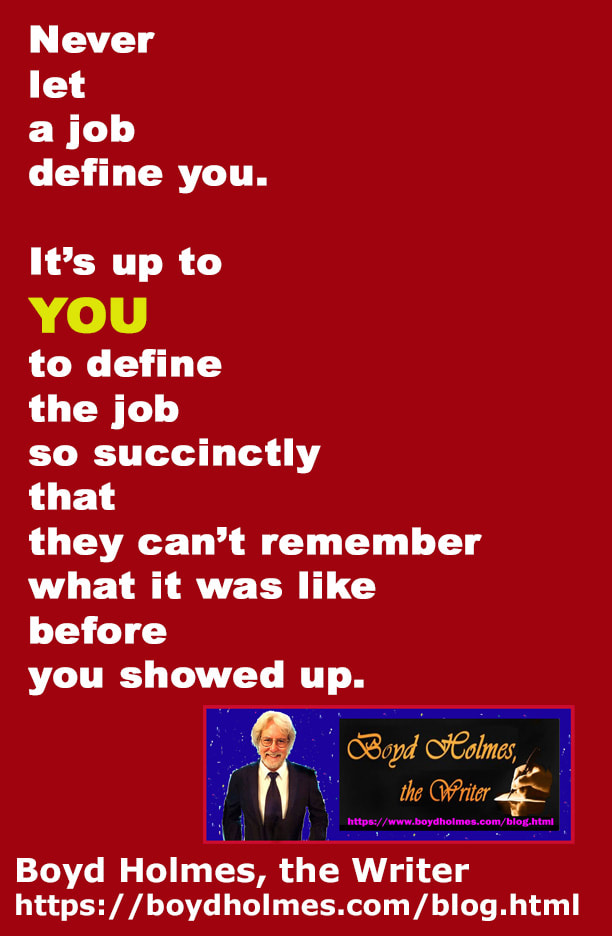
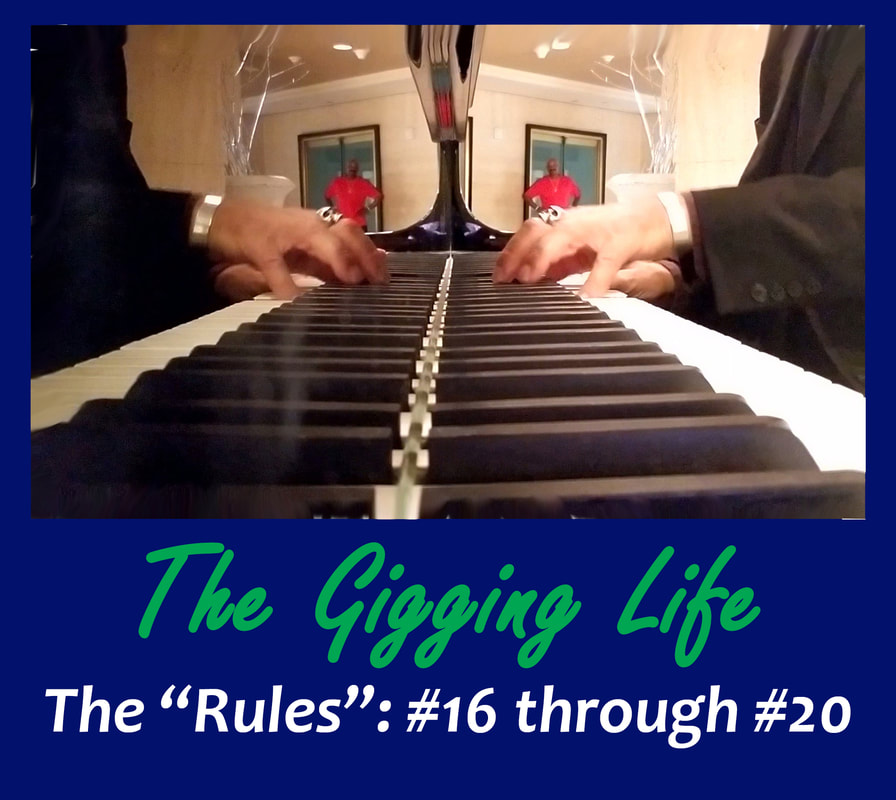
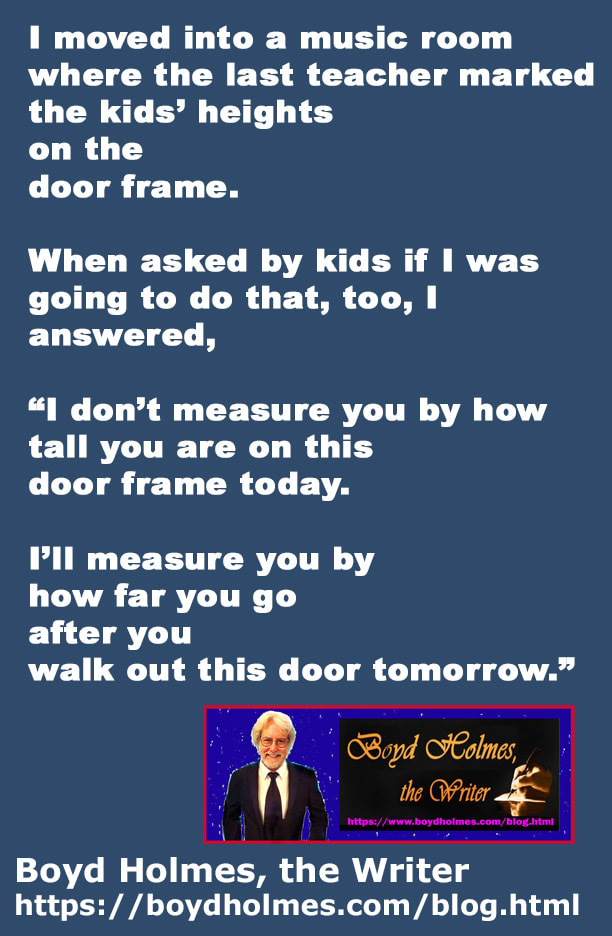
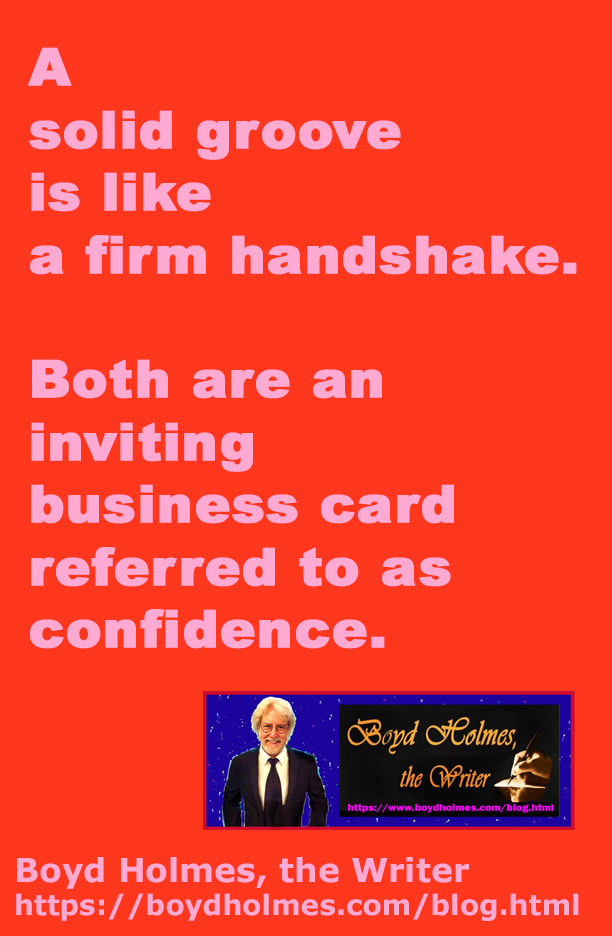
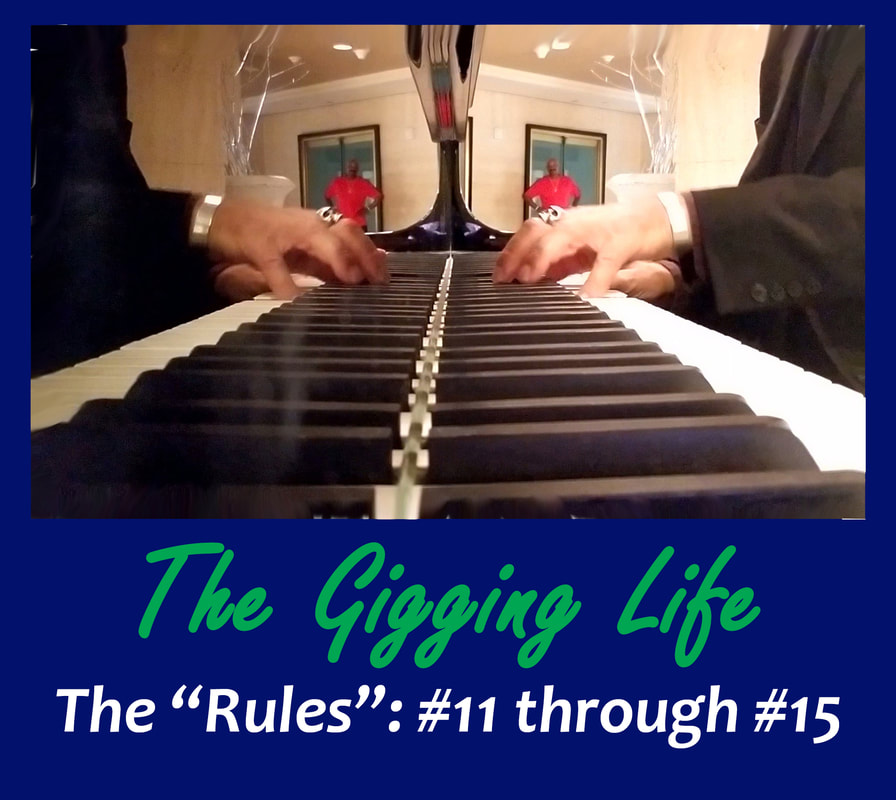
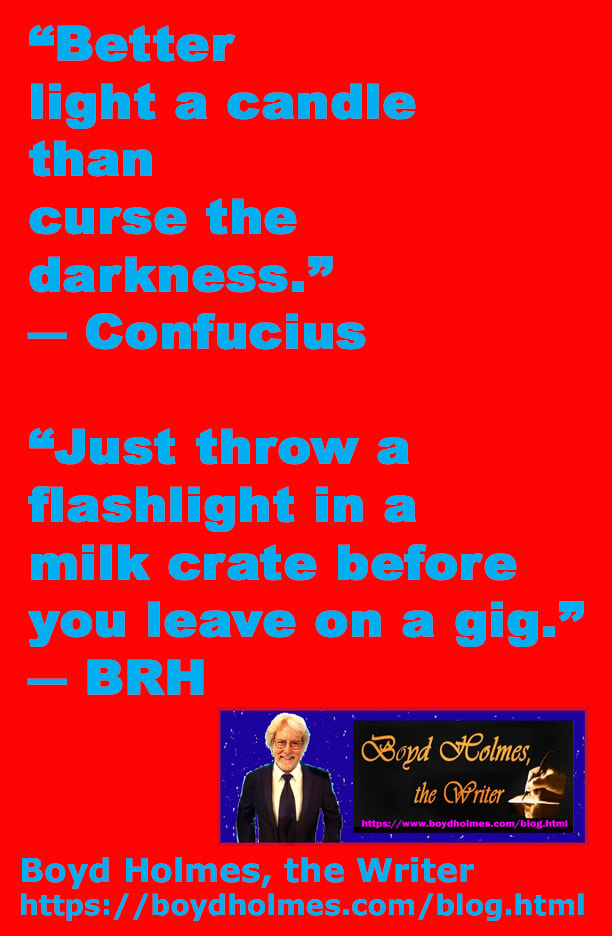
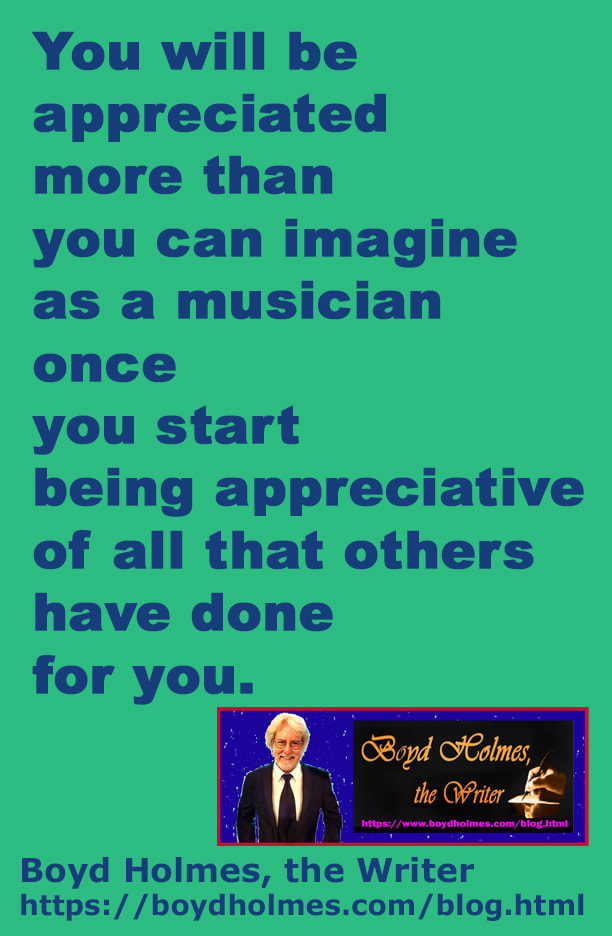
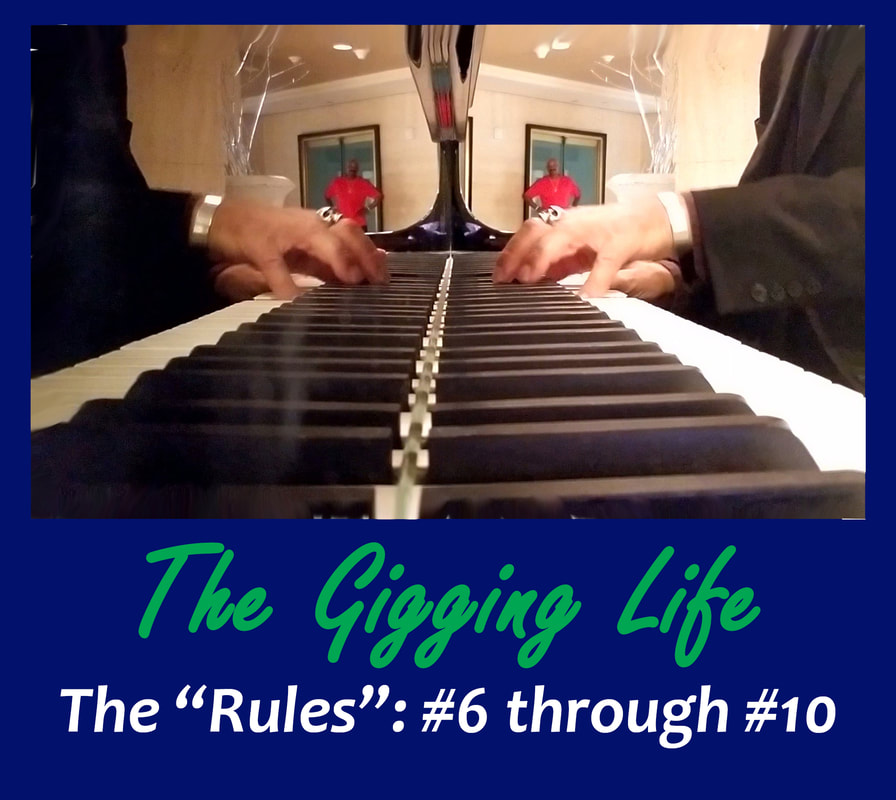
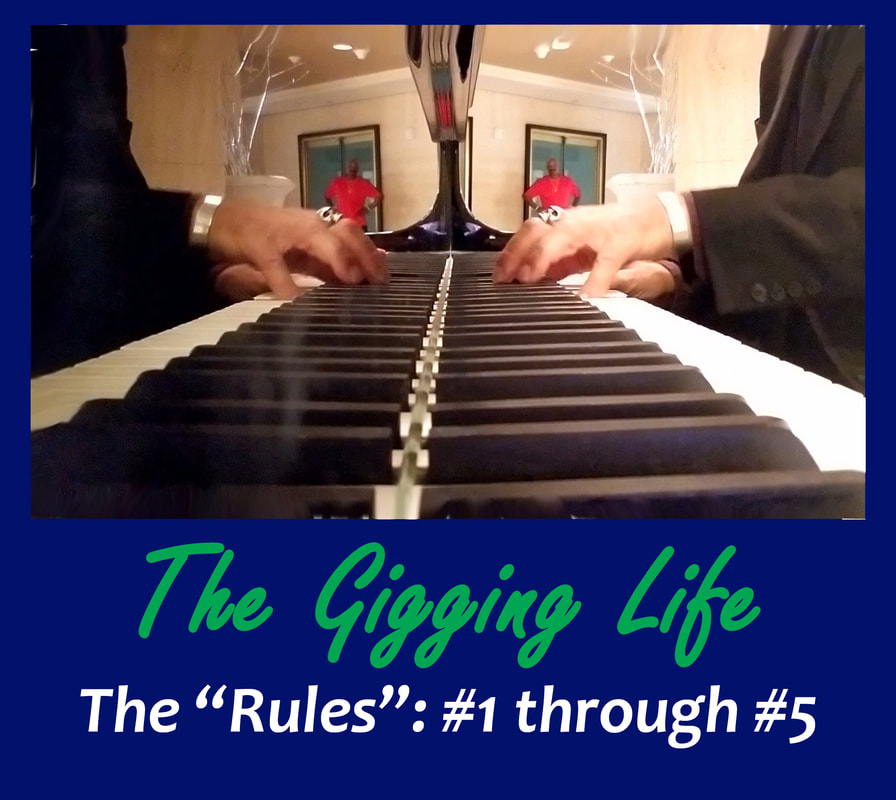
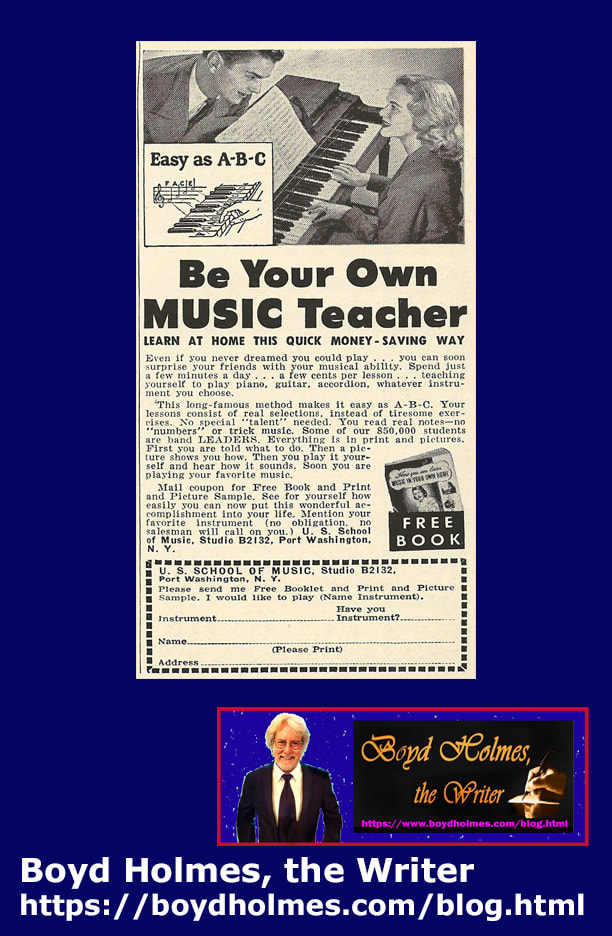
 RSS Feed
RSS Feed